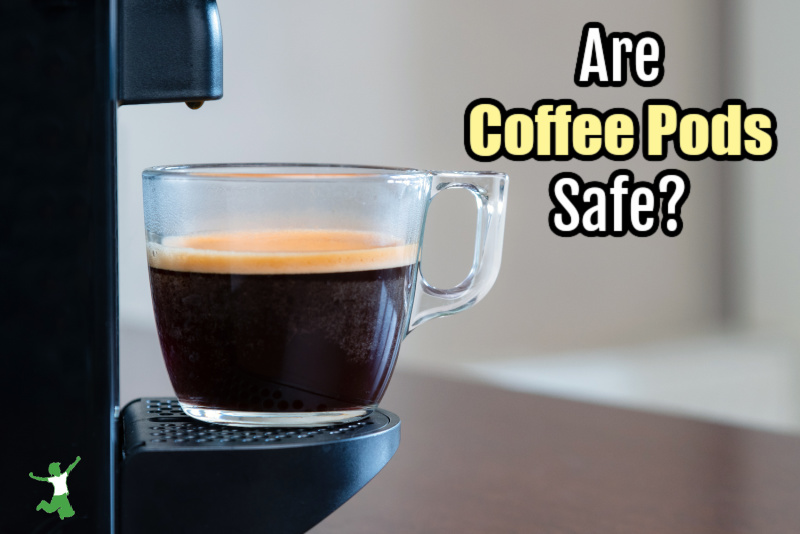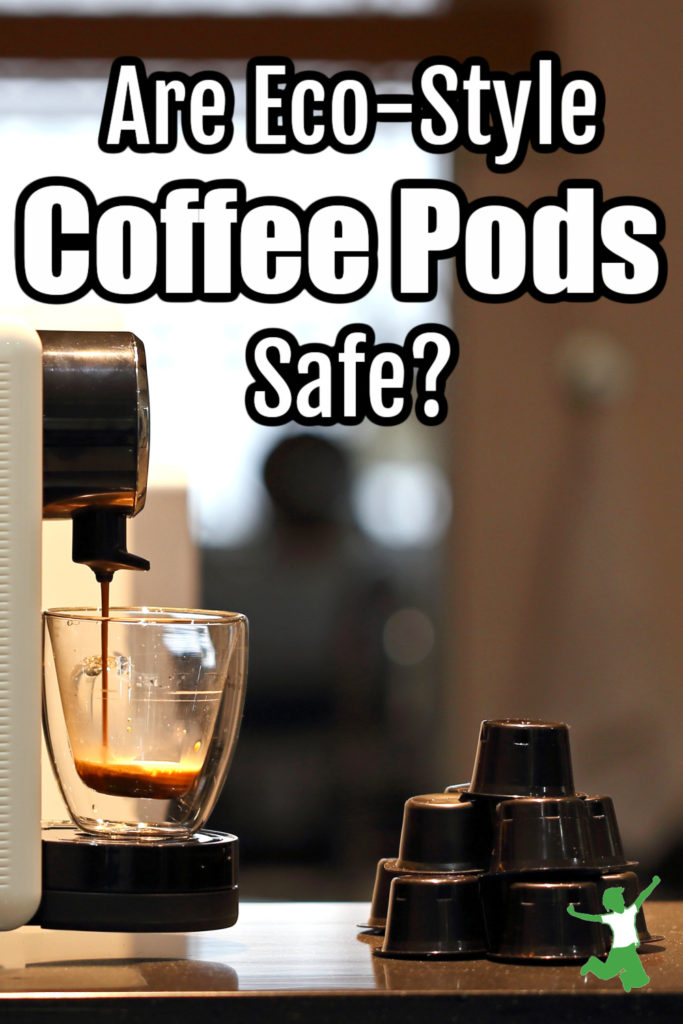Examination of the trend toward “eco” coffee pods and whether recycled, compostable, and/or reusable pods are truly safe to use on a regular basis.

Over the last couple of years, I’ve noticed that businesses are increasingly offering clients complimentary use of single-use hot beverage machines to ease the inconvenience of waiting rooms.
In addition, many hotels have these handy appliances in every guest room.
These machines typically utilize coffee pods as a fast, easy, and mess-free method of preparation.
The incredible convenience of single-use brewing machines has enticed many consumers to buy them for home use as well.
As of 2020, about 40% of US households owned a single-cup brewing system of some kind. (1)
This trend means that the coffee pod has become part of the daily routine for nearly half of coffee drinkers rather than an occasional experience while getting your car serviced.
If you use coffee pods at home, have you ever considered that this type of preparation might have a dark side?
This can be the case even if the coffee is organic and packaged in some form of eco pod.
Should consumers that are health-conscious be using these things or is the old-fashioned drip method or even instant coffee the better choice?
Let’s take a look at the different types of coffee pods out there, especially the eco varieties, and see what we find out!
Coffee Pods and the Disposable Lifestyle
Coffee pods are manufactured in a few different ways.
The most well-known are the small plastic containers that look like coffee creamer. Keurig calls them “K-cups”.
The other pod style is a round mesh bag that is essentially a large tea bag containing ground coffee instead of tea leaves.
These have become much more popular in recent years primarily due to the backlash from environmentalists against K-cup style pods. (2)
Recyclable or Reusable K-Cups?
In response to the backlash against single-use plastics, some k-cup manufacturers switched the type of plastic they used to make the pods.
This allows them to market the cups as “recyclable”. Some of the pods are also reusable.
However, plastic is plastic. They ALL leach and are a source of microplastic contamination, some to a much greater degree than others.
What’s more, the vast majority of recyclable plastic pods never make it to the recycler. (3)
Hence, buying pods made of recyclable plastic is ultimately a green-washing ploy.
The plastic isn’t any safer for you and the chances are slim to none the pod will actually ever be recycled even if you dutifully reuse it a number of times and put it in your recycling container by the curb.
Compostable Coffee Pods
More recently, coffee pods made with “compostable materials” have grown popular with single-use beverage machine users.
This means that the pods supposedly break down quickly, biodegrading naturally in a landfill.
However, the “100% compostable” pod brands I’ve examined actually don’t even recommend that you compost them at home.
Huh?
I don’t know about you, but calling something “100% compostable” and then turning around and advising the consumer not to put them in the home compost bin is more than a bit odd. It suggests that the marketing may not be exactly what it seems.
Eco Packaging Doesn’t Mean Toxin-Free
For example, one organic coffee pod brand states that they only use “certified compostable materials”. (4)
Unfortunately, GMO corn is a prominent material used in compostable packaging. Moreover, the company fails to list the specific compostable materials it uses.
Most people falsely assume that if a food is certified organic, this means safe, nontoxic packaging too.
Unfortunately, this is not the case. For example, one prominent maker of organic tea uses mesh tea bags that release billions of nanoparticles (invisible to the naked eye) when in contact with hot water.
The same potentially goes for coffee pods whether mesh or cup-style. Why are these materials unknown and unlisted?
Awarding a product’s packaging a “certified biodegradable” label means nothing if the consumer has no idea what these materials are that directly contact the food they are consuming!
Are Eco Coffee Pods Healthy?
In summary, unless you have found a small producer of compostable pods that specifically lists the exact “plant-based” materials used and that each pod ingredient is tested regularly to be GMO and chemical-free, I would not assume that “100% compostable” equates with toxin-free.
While eco pods are certainly better for the environment than single-use or recyclable plastic versions, they do not appear to be perfectly safe for the consumer.
This is the case because the “eco pods” themselves are touching the food. Yet, there is a lack of transparency about the specific materials they are made of.
Most Brands Have Issues
The brands of compostable pods I examined had one or more of the following problems:
- The coffee in the compostable pod was not organic, fair trade and single source.
- The company did not actually recommend that the consumer compost the “100% compostable” pods at home. This brings into question the true speed of biodegradability.
- The materials in the compostable pod were not specifically listed or certified as 100% nonGMO and chemical free. Hence, even if the pod could be composted, you wouldn’t actually want to transform it into a soil amendment to put on your home garden.
Thus, when it comes to coffee, it is best to stick with the old-fashioned methods in my view!
While making a cup of coffee using a compostable pod now and then is likely not an issue unless you are particularly sensitive, it is best to avoid using them regularly.
Supposedly eco-friendly, the specific pod materials are ultimately a mystery.
No company I could find actually specifically lists what the compostable ingredients are and whether these substances are tested to be chemical-free.
Hence, a compostable pod could potentially introduce toxins into your coffee just the same as a single-use plastic k-cup.
There seems to always be a price to pay for convenience!
That said, I realize the coffee industry is enormous and there might actually be a good brand out there somewhere.
If you’ve personally found one where you live, please post about it in the comments.

(1) US Ownership of Single-Cup Brewing Systems
(2) The Problem with Coffee Pods
(3) 91% of Plastic Isn’t Recycled
(4) Biodegradable Products Institute








Hi! Thank you for this article. What are your posts on Organic Coffee compostable pods. I know it says they are “commercially compostable” but it does say the components are made of Paper Lidding, a Plant-Based Eco-Friendly Ring, Fresh Ground Coffee, and Commercially Compostable Coffee Filter.
I use a Nespresso Vertuo Next & pack my own stainless steel pods. Will the plastics in the machine release nanoparticles?
Almost certainly yes if they contact hot water.
I use a stainless steel percolator . I wonder if that is ok ? Any thoughts ?
Thx for letting us know I’ve used them for yrs!!
Your studies and reports are so helpful! We remain ever grateful for your work and service.
T Bowie
I use an Ekobrew stainless steel pod and then add my coffee. After reading your article regarding nano particles of plastics, is my coffee really safe to drink? I am now giving thought to the plastic parts that make up my coffee maker! Perhaps I’ll try pour over?
Hi! I switched to pourover a couple of years ago and have never looked back. The flavor of the coffee is deep, rich with a much cleaner coffee taste. No bitterness and it’s easy to customize how strong you want it. Love it!!
Hi I use Starbucks instant in individual packages. Are these safe? I am assuming they have some kind of lining in them.
Starbucks brand is not safe. Conventional packaging garbage that you would expect from a large multi-national corporation. I make an extra effort to never buy anything from this company.